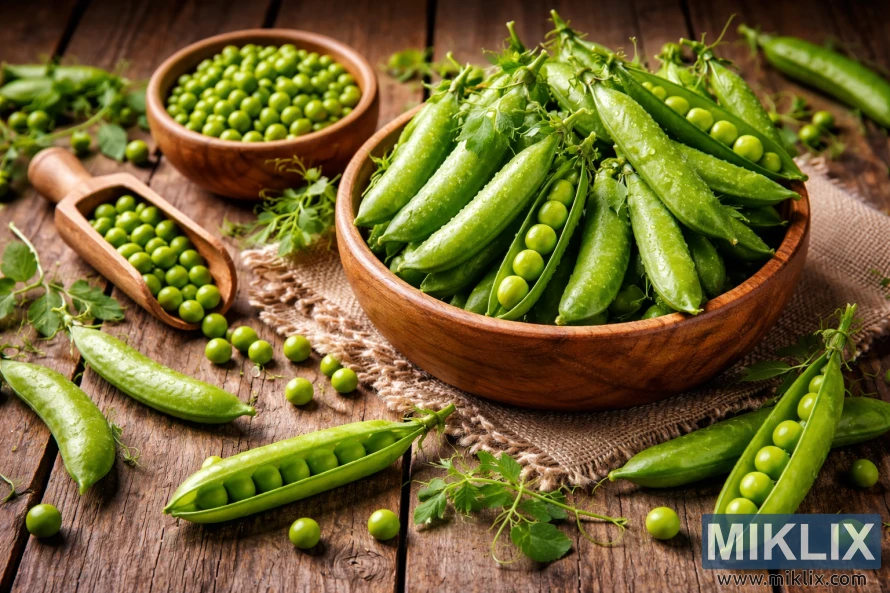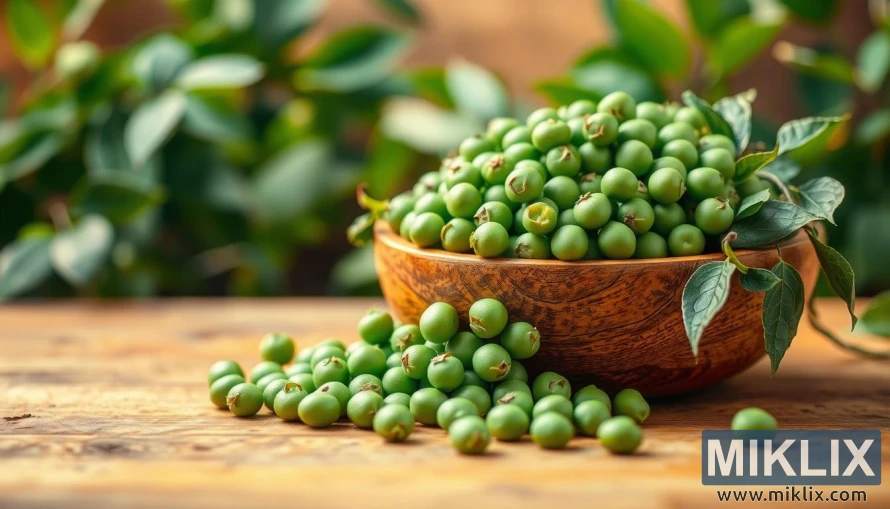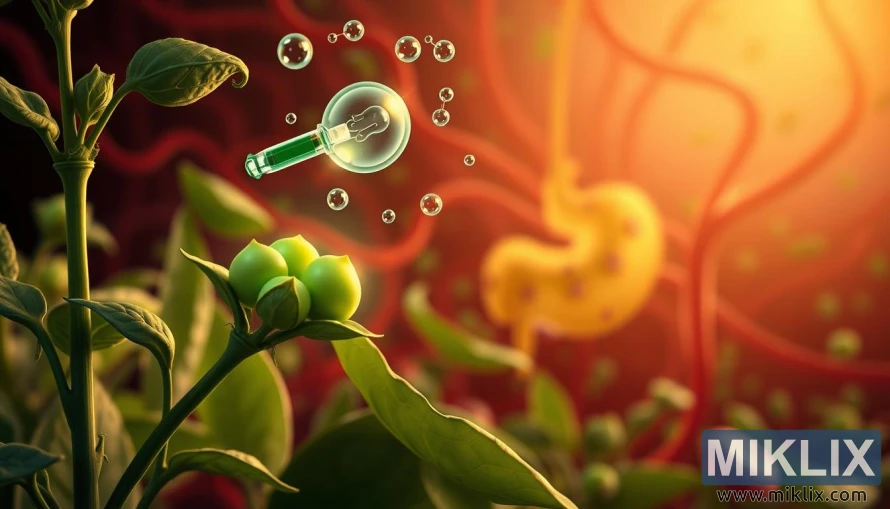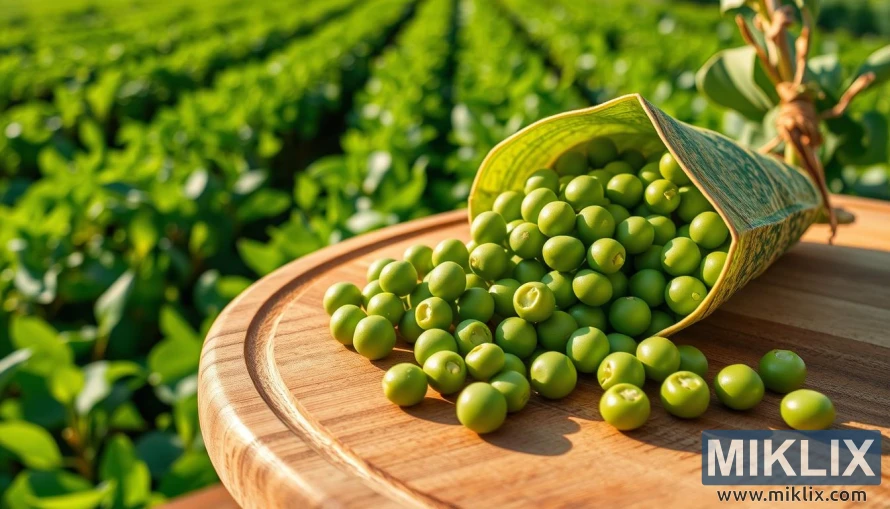Give Peas a Chance: The Tiny Superfood That Packs a Healthy Punch
Published: May 21, 2025 at 10:09:56 AM UTC
Last updated: December 24, 2025 at 9:34:00 AM UTC
Peas are a versatile legume that brings many health benefits. They are packed with nutrients that can improve digestion, support heart health, and help control blood sugar. With many types of peas to choose from, there's something for everyone. Discover how peas can boost your well-being!

Key Takeaways
- Peas are rich in essential nutrients, making them very nutritious.
- They are low in calories, which is great for managing weight.
- Eating peas can help keep your heart healthy.
- Peas are good for digestion because of their fiber.
- They can also help control blood sugar, which is good for diabetics.
- There are many types of peas, each with its own flavor and uses in cooking.
Introduction to Peas
Peas are a fascinating part of the legume family, known as Fabaceae. They are packed with nutrients and have a long history. First grown in the Middle East, peas spread to many places, becoming a favorite in many cultures.
They can be used in many ways, from soups to salads. This makes them a great addition to any meal. Peas are not just tasty; they are also very good for you.
They are full of vitamins, minerals, and fiber. This makes them a key part of a healthy diet. As people look for healthier food, peas are becoming more popular again. They appeal to both old and new tastes.
What Are Peas?
Peas are small, round seeds from the Pisum sativum plant. They grow in pods, with each pod holding 3 to 8 seeds. There are many types of peas, each with its own taste and uses in cooking.
Garden peas, also called green peas, are sweet and tender. They're great in soups, salads, and more. Snow peas are flat and have pods you can eat. They add a nice crunch to stir-fries and salads.
Snap peas are a mix of garden and snow peas. They taste sweet and are fun to eat because they snap when you bite into them. This variety makes peas perfect for many recipes and good for you too.
Nutritional Profile of Peas
A half-cup of cooked green peas has about 67 calories. It also has 4.3 grams of protein and 4.4 grams of fiber. This shows that peas are a low-calorie, nutrient-rich food.
Peas are packed with vitamins and minerals like vitamin A, vitamin K, and iron. These nutrients help with eye health and blood clotting. Plus, the antioxidants and polyphenols in peas boost their health benefits.
Eating peas adds flavor to your meals and increases your fiber intake. This helps with digestion and can make you feel full. So, peas are a great choice for anyone looking to improve their health and nutrition.
Health Benefits of Peas
Peas are packed with nutrients that boost your health. Eating peas regularly can make you feel better overall. They are high in fiber, which helps your digestion and keeps your gut healthy.
Peas also help control blood sugar levels. Their fiber and protein mix keeps your blood sugar stable. This is great for people with diabetes.
The antioxidants in peas fight chronic diseases. These compounds reduce inflammation and protect your heart. Adding peas to your meals can help you stay healthy.

It's easy to add peas to your meals. Try them in stews, salads, or stir-fries. Peas are small but offer big health benefits.
Peas and Heart Health
Adding peas to your meals can greatly benefit your heart. They are packed with potassium and magnesium, which help keep blood pressure in check. These minerals are key for a healthy heart and lower the risk of heart disease. Plus, peas have anti-inflammatory effects that protect your heart.
Studies show a clear link between eating legumes and a healthier heart. Eating peas and other legumes often means a lower risk of heart disease. They're not just a protein source; they also have fiber to help control cholesterol.
While peas don't have a lot of omega-3s, they're a good plant-based option. Pairing them with foods like flaxseeds or walnuts can make your diet even better for your heart.
Eye Health Benefits of Peas
Peas are great for your eyes. They have lots of lutein and zeaxanthin, which protect your eyes. These antioxidants block harmful blue light from screens.
Peas help keep your eyes healthy as you get older. They can reduce the risk of macular degeneration and cataracts. Eating peas regularly is a simple way to care for your eyes.
Adding peas to your meals is fun and good for your eyes. They taste great and are full of nutrients. Peas are a tasty way to keep your eyes and body healthy.
Digestive Health and Peas
Peas are great for your digestive health. They are full of fiber, which helps keep your bowels regular. This fiber is key in preventing constipation and keeping your gut healthy.
Eating peas can also help your gut bacteria grow. A healthy gut microbiome is vital for your digestive system. It helps prevent many digestive problems. Studies show that eating legumes, like peas, can lower the risk of these issues.
Here are some extra benefits of fiber in digestive health:
- Supports healthy bowel function.
- Enhances nutrient absorption.
- Contributes to gut health by feeding beneficial bacteria.
Adding peas to your meals can boost your digestive health. Foods high in fiber, like peas, are good for your gut. They help keep your digestive system working well.
Peas and Blood Sugar Control
Peas are great for keeping blood sugar levels stable. They have a low glycemic index, which means they don't cause blood sugar to spike quickly. This makes them perfect for people with diabetes who want to manage their blood sugar.
Peas are full of fiber and protein. These nutrients help slow down how fast carbs are absorbed. This keeps blood sugar levels steady, which is good for those with type 2 diabetes. Eating peas regularly can also help you feel full and keep your blood sugar in check.
Adding peas to your meals can be both delicious and helpful. Here are some ways to use them:
- Add peas to salads for a refreshing crunch.
- Include them in soups for added flavor and texture.
- Blend peas into smoothies for a nutrient boost.

Anti-inflammatory Properties of Peas
Peas are not just tasty in many dishes; they also have amazing anti-inflammatory benefits. Vitamins C, E, and A help fight inflammation. These vitamins work with phytonutrients like coumestrol and saponins to protect against chronic diseases.
Eating peas can help reduce inflammation, which is good for people with arthritis and diabetes. These nutrients offer quick relief and help prevent serious health problems linked to inflammation.
Adding peas to your meals is a natural way to boost your health. They come with a mix of nutrients that fight inflammation. This makes them a great choice for keeping you healthy.
Cancer-Fighting Potencial of Peas
Research shows that peas can help prevent cancer. They are full of antioxidants that protect cells from damage. Saponins in peas are special because they can stop cancer cells from growing.
Saponins in peas have shown great promise in lab tests. They can reduce inflammation and fight harmful free radicals. This helps keep us healthy and may lower cancer risk, like prostate cancer.
Eating peas regularly adds important nutrients to our diet. It's a tasty way to fight cancer. Peas bring flavor and texture to our meals while helping our health.
Peas and Weight Management
Peas are great for those trying to manage their weight. They are low in calories, so you can eat a lot without worrying about too many calories. They are also full of protein and fiber, which helps you feel full and can help you eat less.
Adding peas to your meals can be both tasty and healthy. Here are some ways they can help with weight management:
- High in fiber, which aids in digestion and promotes feelings of fullness.
- Low in calories, allowing for larger servings compared to many other foods.
- Protein content supports muscle maintenance while losing weight.
Peas can be a big part of a healthy diet. They support your nutrition and help you reach your weight goals. Try adding them to salads, soups, or as a side dish to enjoy their benefits.
Easy Ways to Incorporate Peas into Your Diet
Peas are a versatile vegetable that can enhance various dishes with their sweet flavor and vibrant color. Here are some easy ways to incorporate peas in meals:
- Add peas to salads for a burst of color and nutrition. They pair well with leafy greens, nuts, and cheese.
- Stir-fry with seasonal vegetables and your choice of protein for a quick and satisfying dinner.
- Mix frozen peas into pasta dishes for added texture and flavor. They cook quickly and blend seamlessly with sauces.
- Blend fresh or frozen peas into smoothies for a nutritious boost without compromising taste.
- Use thawed peas in soups to add a pop of sweetness and beautiful green color.
These pea recipes not only make meals enjoyable but also help you reap the health benefits of this nutritious vegetable. Whether cooking with peas on a busy weeknight or preparing a special meal, these tips will keep your menu fresh and exciting.

How to Grow and Harvest Peas
Growing peas is a fun activity for anyone, even beginners. These plants love well-drained soil with good airflow and sunlight. The right conditions help them grow well and produce lots of peas. Here are some tips to start:
- Plant peas in early spring or fall, in cooler USDA zones.
- Make sure the soil is rich and has a pH of 6.0 to 7.0.
- Plant seeds 2 inches apart for better growth.
As peas grow, give them a trellis to climb on. This makes harvesting easier and increases the yield. Harvesting peas is all about timing. They're ready in about two months, when they're tender and sweet. Check often to catch them at their best taste.
Potential Downsides of Eating Peas
Peas are packed with nutrients, but they also have some downsides. They contain antinutrients like lectins and phytic acid. These can block nutrient absorption, affecting how the body uses pea benefits.
Some people might face digestive problems from eating peas. Symptoms like bloating and gas can occur. This is due to the fiber and antinutrients in peas. Eating peas in moderation can help avoid these issues.
To lessen any negative effects, try cooking peas properly. Cooking can break down some antinutrients, making peas easier to digest. This ensures you get the most out of their nutrients. Enjoying peas in a balanced diet, while being aware of your body's limits, can make eating them more enjoyable.
Storage Tips for Fresh Peas
Keeping fresh peas crisp and tasty is easy with the right storage. Place them in the fridge as soon as you get home. Use a breathable bag to keep air flowing and moisture away.
Store them in a high-humidity drawer. This helps keep them fresh for up to five days.
For leftover cooked peas, use airtight containers. They can stay fresh in the fridge for three days. For longer storage, freeze them. Frozen peas can last up to eight months, perfect for future meals.
Cooking Methods for Peas
Cooking peas is a fun experience with many ways to keep them vibrant and tasty. You can steam, microwave, or roast them, each with its own perks.
Steaming is great for keeping peas' nutrients. It cooks them quickly, keeping vitamins in and making them tender. Add a bit of salt or olive oil to boost the flavor without losing health benefits.
Microwaving is quick and keeps peas fresh. It's perfect for busy days, making it easy to add peas to your meals. Just watch the time to avoid overcooking and losing their sweetness.
Roasting gives peas a special flavor, making them crispy and crunchy. Mix herbs and spices before roasting for a tasty snack or side dish.
Choosing the right cooking method helps keep peas healthy. Trying different ways to cook peas can make your meals more fun, healthy, and delicious.
Conclusion
Adding peas to your meals can greatly improve your health and nutrition. These colorful legumes are full of vitamins and minerals. They help your heart, manage weight, and improve digestion.
Peas are easy to add to many dishes, making them a tasty and healthy choice. They offer a wide range of health benefits. By eating peas, you get to enjoy their taste and their health perks.
Adding peas to your diet is a simple way to boost your health. They offer many benefits, making them a great choice for your meals. Choose to eat peas for a healthier, happier you!

Further Reading
If you enjoyed this post, you may also like these suggestions:
- Psyllium Husks for Health: Improve Digestion, Lower Cholesterol, and Support Weight Loss
- Taurine Turbocharge: Natural Support for Metabolism, Mood and Immunity
- MSM Supplements: The Unsung Hero of Joint Health, Skin Glow, and More
